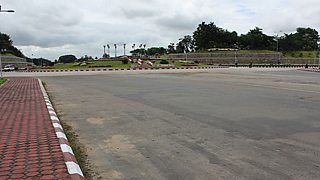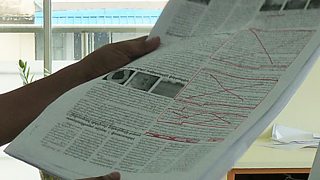
The streets of the Burmese capital Naypyidaw.
But within this bizarre place we found an apparently astonishing transformation in the politicians who now claim they are moving rapidly to introduce democracy and wish "to truly transform the state broadcaster to become a public service broadcaster". If they are true to their word and the changes they promise happen, it would be remarkable.
A small joint team from the 主播大秀 World Service Burmese language section and 主播大秀 Media Action recently carried out a fact-finding visit to Burma, known by its own government as Myanmar. My colleagues Tin Htar Swe, Kathryn Tomlinson and myself discovered a media scene scarcely able to believe the change that is in prospect, mindful of the repression journalism has suffered for decades and fearful that the government's promises may not be realised.

Local journalists told us of the past threats they had received from military intelligence and colleagues who are still imprisoned. Reporters and editors are now having to adjust to the recent ending of pre-publication censorship. We were shown proofs of magazines with the censor’s red pen scrawled over sections of stories which had to be published without the offending text.
Although pre-publication censorship has gone, the government still imposes firm guidelines on sensitive story areas such as security and the problems of ethnic minorities. Journalists no longer know where the limits are. As one said to us, "We do not know how free we are."
Above all, among print and broadcast journalists there is a sense of bewilderment that after years of rules and threats they may now be required to make more editorial judgements for themselves. And they are looking to the 主播大秀 for advice. People in Burma have throughout the 50 years of repression listened to the 主播大秀 in vast numbers as the most trusted source of news. Now the media community expects the 主播大秀 to assist them in this next stage.
Fortunately, 主播大秀 Media Action is well placed to respond. Supported by funds from the UK’s Department for International Development and other donors, we have put together a package of training and development for the broadcast sector. And the Ministry of Information has given Media Action unprecedented permission to open a project office to deliver all of the training package we proposed. If all goes to plan, we will be offering long term support to state and commercial broadcasters to help their journalists and managers improve standards. This will not just be technical training, but the full range of 主播大秀 editorial and values training - an absolute precondition for us working in any country.
Once 主播大秀 Media Action is established in Burma, we will look to develop editorial capacity beyond the news sector, for instance by producing dramas or documentaries that provide information that can help to inform citizens' choices in a county that is desperately impoverished and unequal. 主播大秀 Media Action will be talking urgently with our partners and grant givers to explore the potential for programming to help the promised transformation in Burma.
Although there are encouraging signs, the 主播大秀 will watch developments here vigilantly. We will be determined to ensure that our training is taken seriously and really alters practice on the ground. And, of course, our 主播大秀 News and 主播大秀 World Service programmes will continue to test all sides of opinion in Burma, including the government’s. We are forever committed to the independent and impartial journalism that has given the 主播大秀 such trust among audiences in Burma.
Related links
